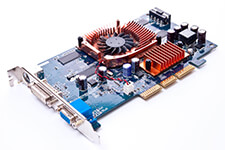AGP
Stands for "Accelerated Graphics Port." AGP is a type of expansion slot designed specifically for graphics cards. It was developed in 1996 as an alternative to the PCI standard. Since the AGP interface provides a dedicated bus for graphics data, AGP cards are able to render graphics faster than comparable PCI graphics cards.
Like PCI slots, AGP slots are built into a computer's motherboard. They have a similar form factor to PCI slots, but can only be used for graphics cards. Additionally, several AGP specifications exist, including AGP 1.0, 2.0, and 3.0, which each use a different voltage. Therefore, AGP cards must be compatible with the specification of the AGP slot they are installed in.
Since AGP cards require an expansion slot, they can only be used in desktop computers. While AGP was popular for about a decade, the technology has been superseded by PCI Express, which was introduced in 2004. For a few years, many desktop computers included both AGP and PCI Express slots, but eventually AGP slots were removed completely. Therefore, most desktop computers manufactured after 2006 do not include an AGP slot.
 Test Your Knowledge
Test Your Knowledge